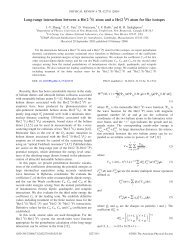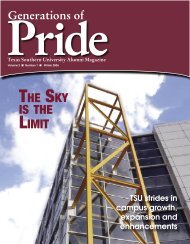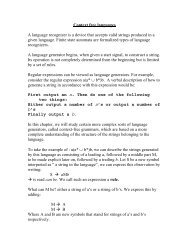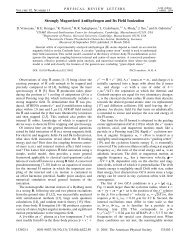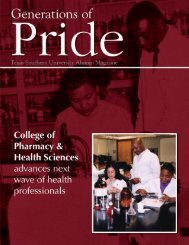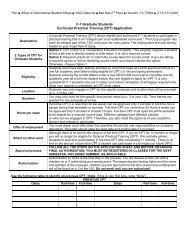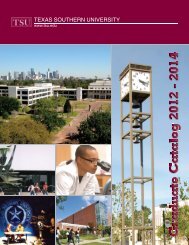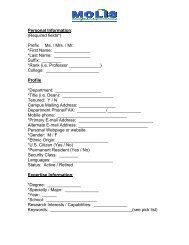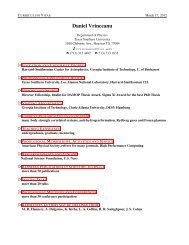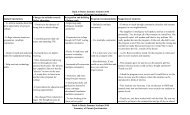DEGREE REQUIREMENTSDoctor of Philosophy Degreein Environmental ToxicologyThe overall requir<strong>em</strong>ents for the Doctor of Philosophy Degree in Environmental toxicology are summarized as follows:1. Satisfactory performance on qualifying examinations.2. Completion of the equivalent of master’s degree credits plus a minimum of nine (9) credit hours must be takenin core courses and a minimum of twenty-four (24) credit hours must be taken in specialization area courses.Six (6) credit hours are required for internship and thirty six (36) credit hours are required for research and dissertation.3. Of the total 75 credit hours, not more than nine (9) (not including the dissertation) can be transferred into theprogram from another <strong>University</strong>. Such transferred credits must have been earned in a doctoral program andmust be of grade B (3.00) or better.4. Satisfactory performance on the Comprehensive Examination.5. Completion of residency requir<strong>em</strong>ent.6. Completion of a satisfactory internship.7. Completion of the research for an acceptable dissertation.8. Satisfactory performance on an oral examination about the dissertation.QUALIFYING EXAMINATIONAfter the student has completed the basic core courses and if necessary, other background courses in biology, ch<strong>em</strong>istry, andmath<strong>em</strong>atics, he/she must pass the qualifying examinations. These examinations will consist of test it<strong>em</strong>s from the core andrelated subject matter areas. A student will be allowed two att<strong>em</strong>pts to pass the qualifying examinations and may petitionto take th<strong>em</strong> a third time.COMPREHENSIVE EXAMINATIONA comprehensive examination is required of all doctoral students and can be taken after the qualifying examinations havebeen passed and all course work in the degree plan has been satisfied. The comprehensive examination will be composedof test it<strong>em</strong>s from the student’s specialization area and questions from the basic core and related courses in environmentaltoxicology. The student will be allowed two att<strong>em</strong>pts to pass the comprehensive examination and may petition to take it athird time.INTERNSHIPUpon the approval of the student’s advisory committee, the doctoral student will be required to participate in an internshipprogram. The internship will require full-time participation of a s<strong>em</strong>ester or two summer terms depending on the laboratoryand the nature of the research project. The internship will carry six s<strong>em</strong>ester hours.DOCTORAL CANDIDACYThe residency requir<strong>em</strong>ent may be met by one of the following:a. Option 1: A minimum full-time course load taken in a regular s<strong>em</strong>ester immediately preceding or followingfull-time enrollment in each of the summer terms.b. Option 2: Enrollment in a minimum full-time course load in two consecutive s<strong>em</strong>esters. Master’s studentswill achieve residency after completing course requir<strong>em</strong>ents.ADMISSION TO CANDIDACYAs a condition for admission to doctoral candidacy, the student must complete all course work, except for the dissertation,satisfy residency and the internship requir<strong>em</strong>ent, and pass the qualifying and the comprehensive examinations. Master’sdegree students will achieve candidacy after passing the qualifying examination, and the English Proficiency, and coursework requir<strong>em</strong>ents.50
CHOICE OF MAJOR ADVISERAt the time of admission each student will be assigned to a graduate student adviser. The graduate student adviser willadvise the student until he/she chooses an area of special interest. Then, each student will interview at least three facultym<strong>em</strong>bers concerning their research interests and involv<strong>em</strong>ents. After these interviews, the student will select a professorwho agrees to serve as his/her major adviser and chair of the thesis or dissertation committee. The committee will be composedof at least three persons from the environmental toxicology faculty. The <strong>Graduate</strong> School dean will assign a graduaterepresentative from outside the environmental toxicology faculty to join the committee when it is formed.DISSERTATIONThe Ph.D. is primarily a research degree and the student is expected to d<strong>em</strong>onstrate the ability to design a research project,to impl<strong>em</strong>ent it, contribute new knowledge to the field of study and write an acceptable dissertation. The dissertation topicand the nature and extent of the research will be recommended by the student and his/her adviser for approval by the dissertationcommittee. The format of the dissertation, described in a booklet from the <strong>Graduate</strong> Office, must be followed. Thedissertation must be defended before the committee in an oral examination. Certification of successful completion of theOral Examination requires the signature of all m<strong>em</strong>bers of the dissertation committee. A student who fails the final oralexamination on the dissertation may petition the Dean of the <strong>Graduate</strong> School through the department for a second att<strong>em</strong>ptto pass the examination. The second att<strong>em</strong>pt cannot be made until at least on s<strong>em</strong>ester has passed since the first att<strong>em</strong>pt.All changes in the dissertation suggested by the committee after the Oral Examination must be made before the dissertationcan receive the final approval of the <strong>Graduate</strong> School. In addition to the dissertation, the student is required to condensethe dissertation or a portion of it into a paper suitable for publication in a refereed journal. This paper must accompany thedissertation when it is presented to the m<strong>em</strong>bers of the committee. In addition, an abstract, not exceeding 350 words mustbe prepared for submission to <strong>University</strong> Microfilms Incorporated.CURRICULUMThe objective of the environmental toxicology program of study is to provide training which will enable students to applythe principles and methods of the physical and biological sciences to the study of toxicants as a basis for solving probl<strong>em</strong>soccasioned by the presence of toxicants in the environment. While the <strong>em</strong>phasis in the master’s program will be on coursework, the Ph.D. degree curriculum is designed to produce graduates who are highly skilled in designing and impl<strong>em</strong>entingresearch studies, analyzing data and applying results that may be used in the formulation of policies and plans for a morehealthy environment. Students may take electives drawn from existing courses in environmental law, health sciences, technologyand manag<strong>em</strong>ent.Students in both the MS and Ph.D. degree programs will study the properties, fate, biological effects, detection and regulationof natural and man-made toxicants present in the environment. Toxicants may include air, water and soil pollutants suchas pesticides, industrial ch<strong>em</strong>icals, and poisons produced by microbes, plants, and animals. The program for Ph.D. degreestudents will have a strong <strong>em</strong>phasis on research.Students working toward the Master’s program must complete 30 s<strong>em</strong>ester credit hours (SCH) of courses and 6 SCH ofresearch. Students working toward the Ph.D. degree must complete a residency as shown in a degree plan that includescourses that support the specialization that the student seeks to achieve. The residency must show a minimum full-timecourse load taken in two consecutive s<strong>em</strong>esters or one s<strong>em</strong>ester of full-time study preceded or followed by two summerterms of full-time course work. Students holding only a Bachelor’s degree who are admitted to the Ph.D. degree programmust complete all of the courses required in the Master’s program in environmental toxicology. Likewise, Master’s degreeholders admitted to the Ph.D. degree program must also show that they have satisfied the course requir<strong>em</strong>ents or equivalentsin the Master’s degree program in environmental toxicology. In addition, all doctoral students must complete the Ph.D.program requir<strong>em</strong>ents.RESEARCH TOPICSStudents may pursue research probl<strong>em</strong>s in the following areas: Air, Water, Soil pollution; Genetic Toxicology; Ch<strong>em</strong>istryand Fate of Pesticides; Pathogenesis of Toxicants; Natural Toxicants.51



